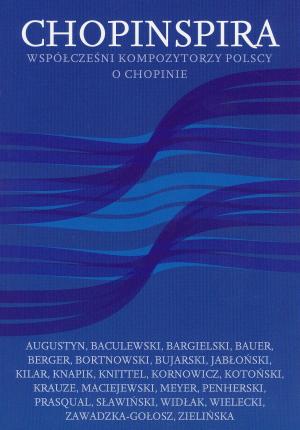
Modern Polish composers about Chopin
Concept, introduction, selection and editing by Krzysztof Droba
Published by Warsaw Autumn 2009, 130 pages (with English summary)
The volume includes texts by 23 composers: Rafał Augustyn, Krzysztof Baculewski, Zbigniew Bargielski, Jerzy Bauer, Roman Berger, Marcin Bortnowski, Zbigniew Bujarski, Maciej Jabłoński, Wojciech Kilar, Eugeniusz Knapik, Krzysztof Knittel, Jerzy Kornowicz, Włodzimierz Kotoński, Zygmunt Krauze, Krzysztof Meyer, Zbigniew Penherski, Prasqual, Adam Sławiński, Wojciech Widłak, Tadeusz Wielecki, Anna Zawadzka-Gołosz, Lidia Zielińska and a reminiscence by Wojciech Maciejewski about his brother Roman.
A few book reviews:
Mieczysław Tomaszewski:
A bold, crazy idea. It’s bold because most anniversary initiatives like this one are usually bound for failure. So it was a risky idea, but it brought about a wonderful result: an examination of conscience by Polish composers and a disclosure of the state of consciousness of our milieu where Chopin has always been very present: usually as a good spirit who has been rooting us and tuning to a certain tone. But also a challenge to be tackled.
This book is an invaluable document for further research on the resonance and reception of Chopin’s music. Some of the testimonials can serve as real food for thought: for example, Roman Berger saying that “Chopin reminds us that beauty is truth made available to the senses”, or Tadeusz Wielecki’s “Chopin as a human genius”.
[from Mieczysław Tomaszewski’s speech at the Chopinspira presentation on 24th February 2010 at the Historical Museum in Warsaw].
Andrzej Chłopecki:
This collection [of testimonials] is extraordinary, because it is neither excessively humble nor too politically correct (even though it’s the Chopin Year, and as we all know Chopin was a great composer, etc.…). All these confessions by Polish composers, including those who talk about their struggle with the icon who in the supermarket of culture has become an idol with an increasing amount of gadgets, are a record of the intense existence of Chopin’s artistic and ideologic message.
[„Gazeta Wyborcza” daily, „Świąteczna” weekend edition, 27–28th February 2010]